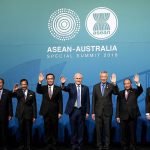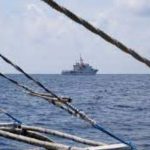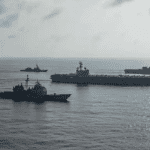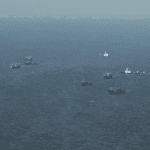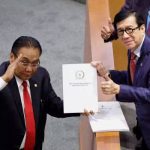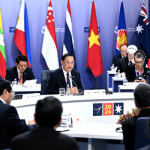Indonesia’s Foreign Minister, Retno Marsudi says her country is prepared to collaborate with other countries in Southeast Asia to complete a long-overdue code of conduct for the South China Sea, where China and many of its neighbors have overlapping claims.
Prior to the visit of Indonesian President Joko Widodo, Retno stated at a joint news conference with his counterpart Enrique Manalo from the Philippines in Manila, “On South China Sea, Indonesia is ready to work together with all ASEAN member states including the Philippines to finalize the Code of Conduct as soon as possible.”
In the meantime, China and the Association of Southeast Asian Nations (ASEAN) have been attempting to establish a framework for code of conduct negotiations since 2002.
Meanwhile, the Association of Southeast Asian Nations (ASEAN) and China have been attempting to develop a framework for negotiating a code of conduct since 2002. Despite all sides’ vows to accelerate and speed the process, progress has been slow.
China asserts its claim on maps by tracing a “nine-dash line” that extends as far south as 1,500 kilometers from its mainland, cutting into the exclusive economic zones of Brunei, Indonesia, Malaysia, the Philippines, and Vietnam.
According to the report, an international arbitration tribunal finding in 2016 invalidated the majority of China’s claims, a result that Beijing has rejected.
Indonesia’s Foreign Minister, Retno Marsudi says her country is prepared to collaborate with other countries in Southeast Asia to complete a long-overdue code of conduct for the South China Sea, where China and many of its neighbors have overlapping claims.
Prior to the visit of Indonesian President Joko Widodo, Retno stated at a joint news conference with his counterpart Enrique Manalo from the Philippines in Manila, “On South China Sea, Indonesia is ready to work together with all ASEAN member states including the Philippines to finalize the Code of Conduct as soon as possible.”
In the meantime, China and the Association of Southeast Asian Nations (ASEAN) have been attempting to establish a framework for code of conduct negotiations since 2002.
Meanwhile, the Association of Southeast Asian Nations (ASEAN) and China have been attempting to develop a framework for negotiating a code of conduct since 2002. Despite all sides’ vows to accelerate and speed the process, progress has been slow.
China asserts its claim on maps by tracing a “nine-dash line” that extends as far south as 1,500 kilometers from its mainland, cutting into the exclusive economic zones of Brunei, Indonesia, Malaysia, the Philippines, and Vietnam.
According to the report, an international arbitration tribunal finding in 2016 invalidated the majority of China’s claims, a result that Beijing has rejected.
Indonesia’s Foreign Minister, Retno Marsudi says her country is prepared to collaborate with other countries in Southeast Asia to complete a long-overdue code of conduct for the South China Sea, where China and many of its neighbors have overlapping claims.
Prior to the visit of Indonesian President Joko Widodo, Retno stated at a joint news conference with his counterpart Enrique Manalo from the Philippines in Manila, “On South China Sea, Indonesia is ready to work together with all ASEAN member states including the Philippines to finalize the Code of Conduct as soon as possible.”
In the meantime, China and the Association of Southeast Asian Nations (ASEAN) have been attempting to establish a framework for code of conduct negotiations since 2002.
Meanwhile, the Association of Southeast Asian Nations (ASEAN) and China have been attempting to develop a framework for negotiating a code of conduct since 2002. Despite all sides’ vows to accelerate and speed the process, progress has been slow.
China asserts its claim on maps by tracing a “nine-dash line” that extends as far south as 1,500 kilometers from its mainland, cutting into the exclusive economic zones of Brunei, Indonesia, Malaysia, the Philippines, and Vietnam.
According to the report, an international arbitration tribunal finding in 2016 invalidated the majority of China’s claims, a result that Beijing has rejected.
Indonesia’s Foreign Minister, Retno Marsudi says her country is prepared to collaborate with other countries in Southeast Asia to complete a long-overdue code of conduct for the South China Sea, where China and many of its neighbors have overlapping claims.
Prior to the visit of Indonesian President Joko Widodo, Retno stated at a joint news conference with his counterpart Enrique Manalo from the Philippines in Manila, “On South China Sea, Indonesia is ready to work together with all ASEAN member states including the Philippines to finalize the Code of Conduct as soon as possible.”
In the meantime, China and the Association of Southeast Asian Nations (ASEAN) have been attempting to establish a framework for code of conduct negotiations since 2002.
Meanwhile, the Association of Southeast Asian Nations (ASEAN) and China have been attempting to develop a framework for negotiating a code of conduct since 2002. Despite all sides’ vows to accelerate and speed the process, progress has been slow.
China asserts its claim on maps by tracing a “nine-dash line” that extends as far south as 1,500 kilometers from its mainland, cutting into the exclusive economic zones of Brunei, Indonesia, Malaysia, the Philippines, and Vietnam.
According to the report, an international arbitration tribunal finding in 2016 invalidated the majority of China’s claims, a result that Beijing has rejected.
Indonesia’s Foreign Minister, Retno Marsudi says her country is prepared to collaborate with other countries in Southeast Asia to complete a long-overdue code of conduct for the South China Sea, where China and many of its neighbors have overlapping claims.
Prior to the visit of Indonesian President Joko Widodo, Retno stated at a joint news conference with his counterpart Enrique Manalo from the Philippines in Manila, “On South China Sea, Indonesia is ready to work together with all ASEAN member states including the Philippines to finalize the Code of Conduct as soon as possible.”
In the meantime, China and the Association of Southeast Asian Nations (ASEAN) have been attempting to establish a framework for code of conduct negotiations since 2002.
Meanwhile, the Association of Southeast Asian Nations (ASEAN) and China have been attempting to develop a framework for negotiating a code of conduct since 2002. Despite all sides’ vows to accelerate and speed the process, progress has been slow.
China asserts its claim on maps by tracing a “nine-dash line” that extends as far south as 1,500 kilometers from its mainland, cutting into the exclusive economic zones of Brunei, Indonesia, Malaysia, the Philippines, and Vietnam.
According to the report, an international arbitration tribunal finding in 2016 invalidated the majority of China’s claims, a result that Beijing has rejected.
Indonesia’s Foreign Minister, Retno Marsudi says her country is prepared to collaborate with other countries in Southeast Asia to complete a long-overdue code of conduct for the South China Sea, where China and many of its neighbors have overlapping claims.
Prior to the visit of Indonesian President Joko Widodo, Retno stated at a joint news conference with his counterpart Enrique Manalo from the Philippines in Manila, “On South China Sea, Indonesia is ready to work together with all ASEAN member states including the Philippines to finalize the Code of Conduct as soon as possible.”
In the meantime, China and the Association of Southeast Asian Nations (ASEAN) have been attempting to establish a framework for code of conduct negotiations since 2002.
Meanwhile, the Association of Southeast Asian Nations (ASEAN) and China have been attempting to develop a framework for negotiating a code of conduct since 2002. Despite all sides’ vows to accelerate and speed the process, progress has been slow.
China asserts its claim on maps by tracing a “nine-dash line” that extends as far south as 1,500 kilometers from its mainland, cutting into the exclusive economic zones of Brunei, Indonesia, Malaysia, the Philippines, and Vietnam.
According to the report, an international arbitration tribunal finding in 2016 invalidated the majority of China’s claims, a result that Beijing has rejected.
Indonesia’s Foreign Minister, Retno Marsudi says her country is prepared to collaborate with other countries in Southeast Asia to complete a long-overdue code of conduct for the South China Sea, where China and many of its neighbors have overlapping claims.
Prior to the visit of Indonesian President Joko Widodo, Retno stated at a joint news conference with his counterpart Enrique Manalo from the Philippines in Manila, “On South China Sea, Indonesia is ready to work together with all ASEAN member states including the Philippines to finalize the Code of Conduct as soon as possible.”
In the meantime, China and the Association of Southeast Asian Nations (ASEAN) have been attempting to establish a framework for code of conduct negotiations since 2002.
Meanwhile, the Association of Southeast Asian Nations (ASEAN) and China have been attempting to develop a framework for negotiating a code of conduct since 2002. Despite all sides’ vows to accelerate and speed the process, progress has been slow.
China asserts its claim on maps by tracing a “nine-dash line” that extends as far south as 1,500 kilometers from its mainland, cutting into the exclusive economic zones of Brunei, Indonesia, Malaysia, the Philippines, and Vietnam.
According to the report, an international arbitration tribunal finding in 2016 invalidated the majority of China’s claims, a result that Beijing has rejected.
Indonesia’s Foreign Minister, Retno Marsudi says her country is prepared to collaborate with other countries in Southeast Asia to complete a long-overdue code of conduct for the South China Sea, where China and many of its neighbors have overlapping claims.
Prior to the visit of Indonesian President Joko Widodo, Retno stated at a joint news conference with his counterpart Enrique Manalo from the Philippines in Manila, “On South China Sea, Indonesia is ready to work together with all ASEAN member states including the Philippines to finalize the Code of Conduct as soon as possible.”
In the meantime, China and the Association of Southeast Asian Nations (ASEAN) have been attempting to establish a framework for code of conduct negotiations since 2002.
Meanwhile, the Association of Southeast Asian Nations (ASEAN) and China have been attempting to develop a framework for negotiating a code of conduct since 2002. Despite all sides’ vows to accelerate and speed the process, progress has been slow.
China asserts its claim on maps by tracing a “nine-dash line” that extends as far south as 1,500 kilometers from its mainland, cutting into the exclusive economic zones of Brunei, Indonesia, Malaysia, the Philippines, and Vietnam.
According to the report, an international arbitration tribunal finding in 2016 invalidated the majority of China’s claims, a result that Beijing has rejected.



